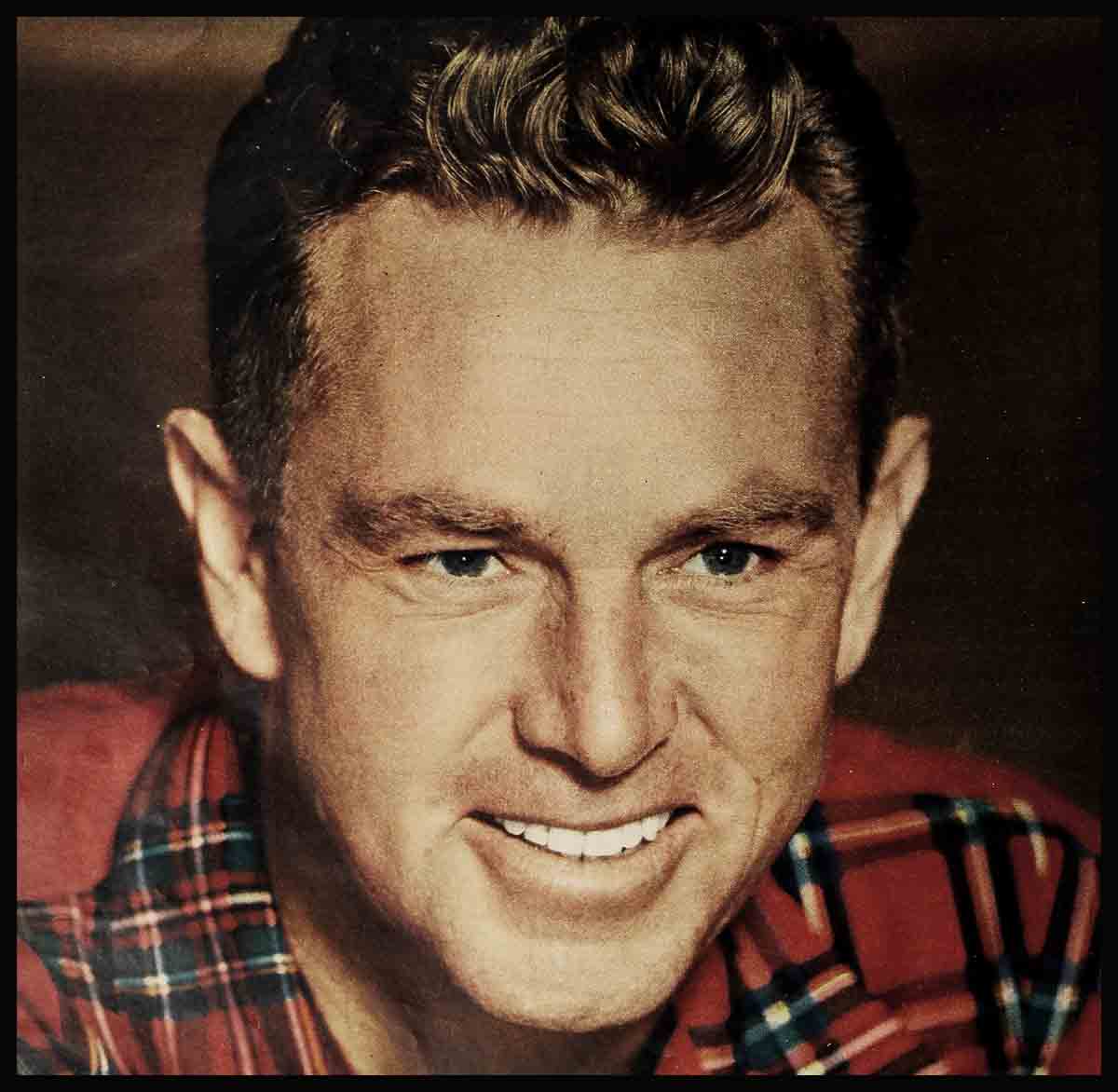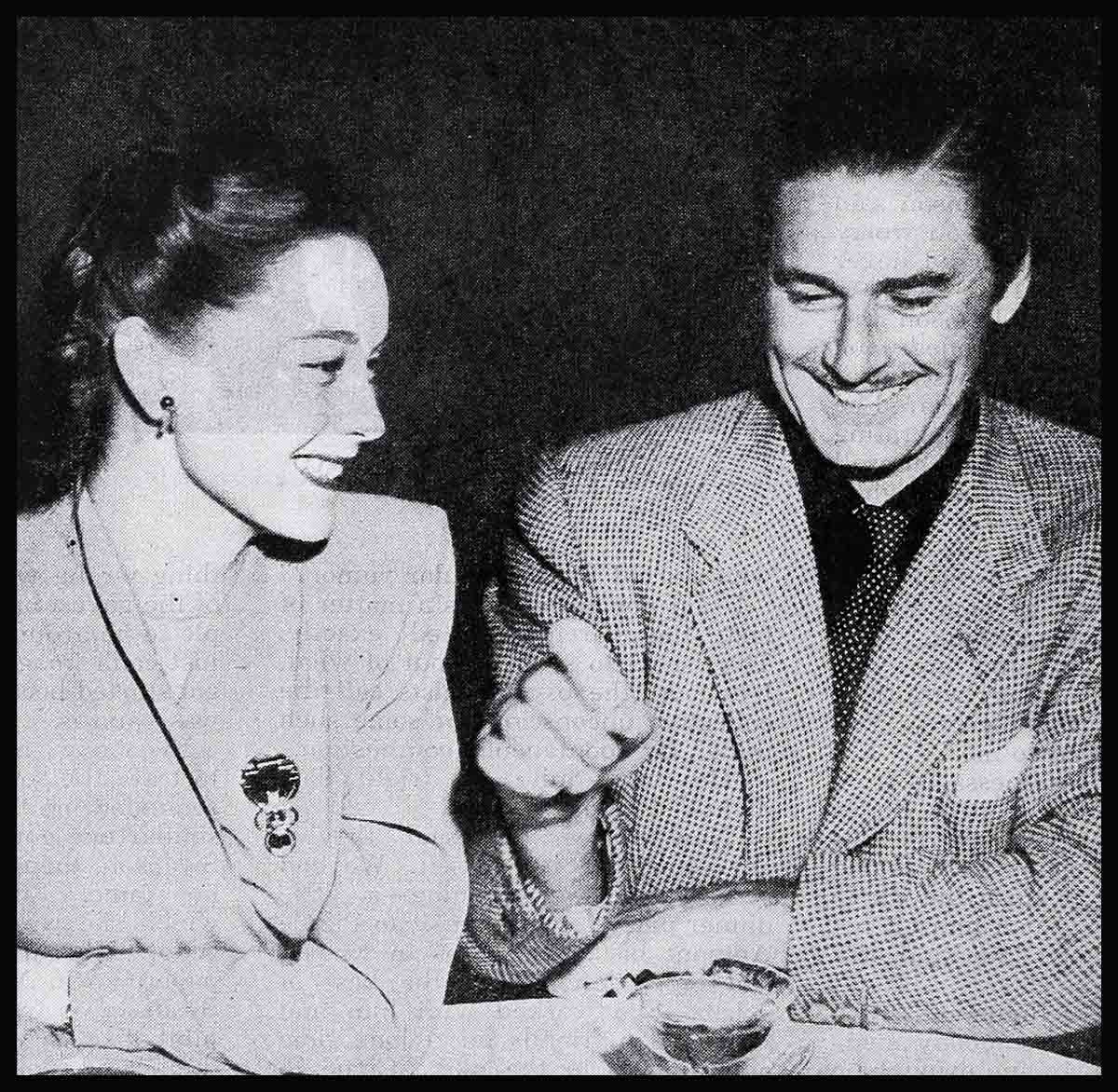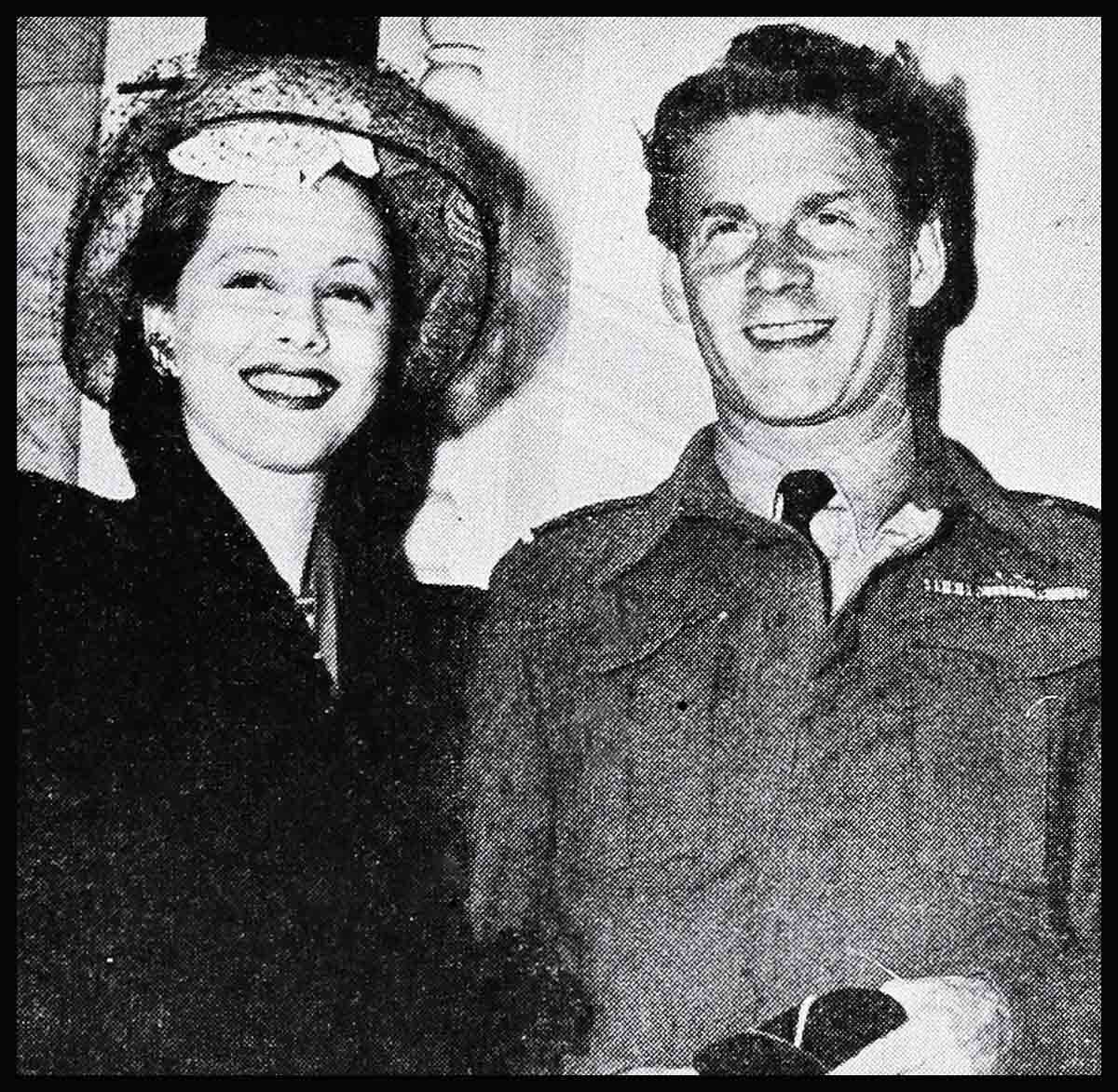
Why I Ran from Fame?—Sterling Hayden
“A second try, a third try, a fourth try—I’m running out of numbers,” Sterling Hayden smiled whimsically. “Pick a number from one to ten. My story is full of ups and downs, starts and stops, but no ending.
“For a year now,” he said, “they’ve been trying to put my life story together for a movie. I tell them that for every story, there’s got to be a beginning and an ending. And who has an ending at thirty-six?”
I’d met Sterling Hayden when I first came to Hollywood, my eyes filled with stardust. Like a few million other femmes, I saw this husky, outdoor-loving, tall, broad-shouldered, blond-headed then twenty-three-year-old—and wisely decided then and there—I’d like to be just good friends with the guy. Confidentially, “He’s madly in love with Madeleine Carroll,” the studio press agent had told me.
This current second try of his at a screen career is convincingly obvious that, at long last, Sterling Hayden is taking his life seriously. I had seen him in “Hellgate” (not a woman’s picture), but this eloquent performance was of Academy Award calibre. Then “Flat Top,” in which he played the hard disciplinary naval officer, which Allied Artists had sent us to view aboard the big plane carrier in San Diego harbor where it had been filmed. On the train home, I found myself seated next to Sterling, and I both commented and asked, “This time you’re really serious. You’re giving your career—what men call—some guts. You’re a regular Rock of Gibraltar, but understanding, unwavering and with a heart. Before, you’ve always run away from Hollywood. Now—are you here to stay?”

“I hope so,” he replied.
After seeing him in “The Star,” with Bette Davis, then in Ross Hunter’s “Take Me To Town” and now in “So Big,” with Jane Wyman, at Warners, I put in a call for Mr. Hayden. He promptly replied and the next day there he was, sitting right in my living room.
His most outstanding assets are his complete honesty, his complete lack of guile or pretense and his way of looking straight into your eyes when he speaks.
“I am what I am and I make no excuses,” reflects in his manner which is on the analytical side. Coupled with a delightful sense of humor, he is a fascinating and intelligent conversationalist.
“A lot of water has gone under the bridge,” he admitted, “since the first time I talked to you. Then I was madly infatuated with Madeleine Carroll, had no idea what a motion picture career meant, knew I wasn’t equipped to be a good actor, and cared less. I’d served no apprenticeship in this profession, didn’t know my trade. I was rushed into a lead in my first picture, had only a slight idea what it was all about. All that mattered to me then was to make some money to buy a new schooner. And, of course, I was a gone-beaver the first time I saw Madeleine. I was in love and my one thought was to persuade her to marry me. There was a certain Frenchman she liked and I kept trying to talk her out of him. If I was any good in love scenes, it was because they were real. With her in my arms, I could forget cameras, technique and what have you. When she wouldn’t marry me, Hollywood wasn’t for me. So I left. And no matter what the studio said about throwing away my career, it didn’t matter.
“That was in ’41—after my first year in Hollywood. I had the feeling that Madeleine would never marry an actor. I was out of my element in the glamour business of being a movie hero. I went to sea to run away from it all. Actually, I was later to discover, I was always running away. Away from myself.

“I was skippering a trading schooner in the Caribbean. Again I was working at something I knew, but my mind was still on Madeleine. When I came into New York port—and heard that Madeleine was there—well, we were married. My infatuation for her and our marriage, I hoped, would be the anchor I needed to fasten me down to life, as everyone else lived it. But my illusion was not practical. My trips to sea, and her work, meant a couple of weeks, a month at the most together. There were four in New York, two in Washington, D.C., and again we met in Belgium. By then, our love had long passed that fever pitch and we both knew it. We had had a lot of pleasure together, but it was over. I weathered out the residence in Reno, and she cross-filed for the divorce. During those six weeks, I learned to ski. I had to do something. I was consumed with a driving nervous energy, and yet, I couldn’t channel it in a constructive way to make me content with my life. Always, I was moving, moving on to something new, seeking something intangible that I myself didn’t understand nor recognize.
“When the War broke, I wanted to get into it, get at the bottom of it. Asa civilian, without military restrictions and regulations, I sailed to England with a convoy. Then, I went to Glasgow to train with a Polish Commando outfit and arrived the night of Pearl Harbor. I was trained as a guerilla and later I trained them. I broke my leg in a jump, finally wound up in the Marines. Then I was stuck. My roving days were over. All of my life, I had jumped around and still wanted to jump around. On that thought, I had a lot of company, except the Marines had different ideas. It was the best thing that could ever have happened to me. I had to stick. I couldn’t run away.”
Sterling was commissioned a lieutenant. Everywhere he went, he was also known as Sterling Hayden, Hollywood movie star.
“I disliked the handle of actor preceding me everywhere I went. I had my name legally changed to John Hamilton, which is still my legal name.”

The Hayden war record is as adventurous and dramatic as any Hollywood thriller. Assigned to top secret O.S.S., he captained a boat running the German blockade of the Dalmatian Coast, parachuted into beleaguered Jugoslavia, worked getting supplies to Tito’s anti-Fascist forces and accomplished regular cloak and dagger assignments into Cairo, the Big Three Conference and to the Shangri-La vastness of outer Mongolia. The highest decorations for an incredible war record were his. Today, Sterling dismisses it with, “Who’s a hero? It’s hard to say what’s a terrific war record. Take a door and grenades coming in the window and anyone goes out the door. Does that make a hero?”
After the War, Sterling returned to Hollywood. Paramount was so proud, they not only upped his salary, but gave him a bonus of a new schooner. “I had everything I had ever wanted, a boat of my own, but there was still that old restlessness always fighting some unknown extremities within myself. The War had mixed me all up. I didn’t know what I wanted. I had always run off to sea. When a man’s a thousand miles or so out to sea, he is as far away as one can get. From there, there’s no place further to go.

“I had left school when I was fifteen. My father died when I was nine and my mother and I lived in a dozen cities in the northeastern states. My stepfather and I didn’t get along, and my whole childhood was unstable, confused and insecure, a feeling which grew up with me. There was old Captain Al McIntyre who taught me the tricks of sailing when I lived in Boothbay Harbor on the Maine seacoast. My life’s ambition was to have my own boat to skipper. When I had realized that, I was ready to try some thing else. So I tried Hollywood. When it was going well, I ran away. Today, I realize that it was all emotional immaturity. I was still a kid, and had not grown up to face life realistically.
“Betty De Noon was a Pasadena society girl and her willingness to live on a boat and share my life seemed the answer to my continuous search for a life like other people knew. But sitting on a boat that never went anywhere, every day, is neither fish nor fowl. There’s no purpose, no objective. I quit Paramount again and, for a year, I sat and thought myself out. I had become an escapist, always ready to get away, get out of touch with the world. I had resigned my contract. What was my design for living? My purpose in life?
“During the War, I had been greatly shaken by the things I had seen. They called this humanity? I became interested when I was approached to help in creating a better world, working for a better world. The world should be concerned about doing more for other people. I had long wanted to channel my energies to worthwhile things, but I had never had a plan nor a way of going about it. That’s where the Commies came in.
“Hollywood has a high percentage of emotionally unstable people. Acting makes therm feel special if they are a success. For some, even that form of recognition isn’t special enough. For people not easily adjusted to society and filled with a real inner loneliness, people who have not been able to ingratiate themselves and have homes, happy marriages and children, people who are filled with insecurity and who want to be needed, to feel important, the dinner parties where they are invited to speak their piece, to spout off about world affairs and making a better world, are an excellent foil to trap them. In due time, the intelligent ones wake up to what all of this propaganda means, and denounce it for what it stands for.
“So I had to run away from pictures, had been involved with the Commies, had absolved myself and now I am back in pictures. Now, I began to try to make my life count. If pictures offered me an opportunity, I now wanted to make good. I had the basic intelligence to learn. I studied acting seriously. I took a course of treatments in psychoanalysis to discover why I had been so filled with inhibitions, why I had always run away from Hollywood, from pictures, from any success that I might attain. I found I was filled with inhibitions that tied me up in knots. I had never been able to let myself go—to give. I discovered there are no mysteries if you analyze them and their applications to yourself. It is a case of sweat, work and self-appliance.”
Regarding his marriage and pending divorce from Betty, and their four small children—he frowned, “I’m not running away. It is just too complicated to discuss. This was not just an infatuation, but a real marriage with four little lives involved. To me, it is far too serious and personal ever to talk about publicly.” That he adores his children—Christian, four; Dana, three; Gretchen, two and Matthew, four months—was easy to see. He sees them regularly.
“This cursed state of single blessedness is no good,” he remarked. His family lives in their Beverly Hills home. Sterling has acquired an apartment in the Hollywood hills.
“I dislike it intensely, this living alone.” With a shrug of his shoulder he concluded, “I am looking forward to putting together a small stock company to make pictures—perhaps for TV—with a marine angle. Not that ’m nostalgic for a boat. I’ve outgrown that. But simply the fact that I know the sea—and it is something I can do with some amount of knowledge and authority. I have no idea of sitting on a boat at Newport and seeing the smog go by.”
As he left, I invited him to a party the following Sunday. He shook his head with a smile and I found myself like one of those Hollywood hostesses—coaxing.
“First things come first. They must,” he replied, which revealed that the Hayden roles he plays on the screen, which have shot him to the top—are the real Hayden.
THE END
—BY MAY MANN BAER
It is a quote. SCREENLAND MAGAZINE JULY 1953





No Comments